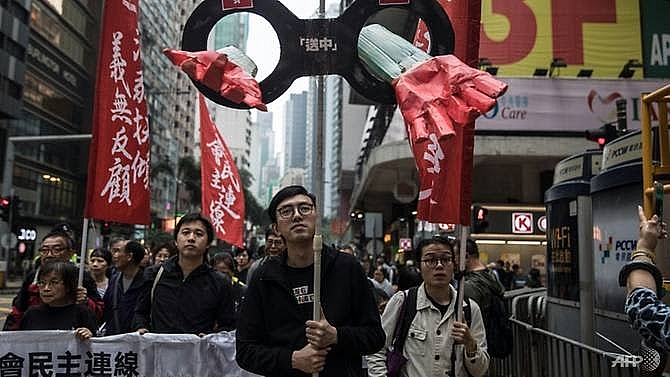Fugitive tycoon to challenge Hong Kong's extradition plans
 |
| Protesters marched in Hong Kong on Sunday to protest against the government's plans to approve extraditions with mainland China, Taiwan and Macau AFP/Dale DE LA REY |
Hong Kong property tycoon Joseph Lau is wanted in Macau where he was convicted in absentia for bribery in the gambling enclave in 2014.
He remains a free man because Hong Kong and Macau do not currently have an extradition agreement.
Hong Kong's government has recently announced plans to overhaul its extradition rules, allowing the transfer of fugitives with Taiwan, Macau and mainland China on a "case-basis" for the first time.
The proposal has sparked large protests and mounting alarm within the city's business and legal communities who fear it will hammer the financial hub's international appeal and tangle people up in China's opaque courts.
Lau has applied for leave to legally challenge the government's extradition proposal, according to a court application obtained by AFP, which also states that he has chosen to "exile himself from Hong Kong".
"The bill, once enacted, would hang over those it affects like a cloud," Lau's lawyers wrote in the application filed in the city's High Court.
"He has felt compelled to leave Hong Kong until there is more clarity on the extradition bill," lawyer Gerard McCoy told AFP.
The application asks the court to declare that any extradition agreement cannot be applied retroactively and argues that the city's leader Carrie Lam is being granted too much discretionary power to decide cases under the proposal.
PROTESTS AND ALARM
Thousands of protesters hit the streets of Hong Kong on Sunday to demonstrate against the new extradition proposal, which will be discussed in the city's legislature on Wednesday.
Even a number of pro-Beijing politicians and prominent businesspeople have joined a growing chorus of opposition, while Taiwan's Mainland Affairs Council said it may issue travel warnings if the extradition agreement included China.
The proposal comes at a time of roiling distrust over how Beijing wields its authoritarian legal system -- and as two Canadian nationals languish in Chinese custody following the arrest of a top Huawei executive in Vancouver.
The Hong Kong government backtracked last week under pressure and exempted nine primarily economic crimes from the list of offences that could be covered by the new extradition law.
Critics fear any extradition agreement could leave both business figures and dissidents in Hong Kong vulnerable to China's politicised courts, fatally undermining a business hub that has thrived off its reputation for a transparent and independent judiciary.
The sudden plan to overhaul Hong Kong's extradition agreement was sparked by a high-profile murder in Taiwan where a Hong Kong man allegedly strangled his pregnant girlfriend during a holiday trip and then fled.
Historically Hong Kong has baulked at extraditing to the mainland because of the opacity of China's criminal justice system, and the death penalty - which has been abolished in Hong Kong.
Lau made headlines in 2015 when he spent a combined US$76.9 million at auction to buy two rare diamonds for his young daughter.
He argues his trial in Macau was unfair because he was unable to attend due to ill health and that the city has refused to grant him a right to a retrial.
What the stars mean:
★ Poor ★ ★ Promising ★★★ Good ★★★★ Very good ★★★★★ Exceptional
 Tag:
Tag:
Related Contents
Latest News
More News
- Russian President congratulates Vietnamese Party leader during phone talks (January 25, 2026 | 09:58)
- Worldwide congratulations underscore confidence in Vietnam’s 14th Party Congress (January 23, 2026 | 09:02)
- Political parties, organisations, int’l friends send congratulations to 14th National Party Congress (January 22, 2026 | 09:33)
- 14th National Party Congress: Japanese media highlight Vietnam’s growth targets (January 21, 2026 | 09:46)
- 14th National Party Congress: Driving force for Vietnam to continue renewal, innovation, breakthroughs (January 21, 2026 | 09:42)
- Vietnam remains spiritual support for progressive forces: Colombian party leader (January 21, 2026 | 08:00)
- Int'l media provides large coverage of 14th National Party Congress's first working day (January 20, 2026 | 09:09)
- Vietnamese firms win top honours at ASEAN Digital Awards (January 16, 2026 | 16:45)
- ASEAN Digital Ministers' Meeting opens in Hanoi (January 15, 2026 | 15:33)
- ASEAN economies move up the global chip value chain (December 09, 2025 | 13:32)






















 Mobile Version
Mobile Version